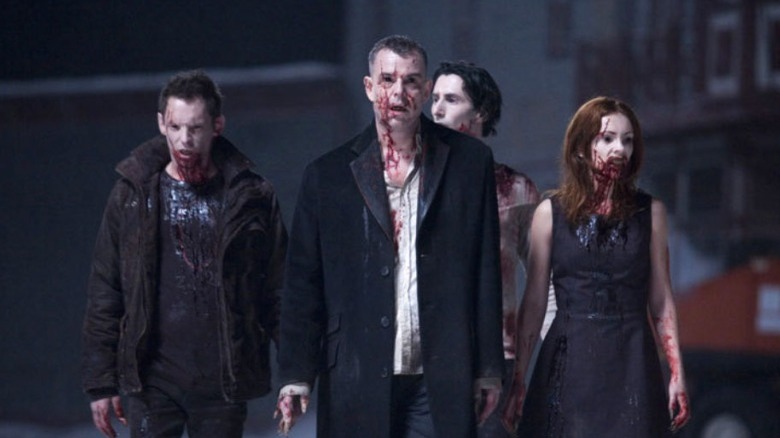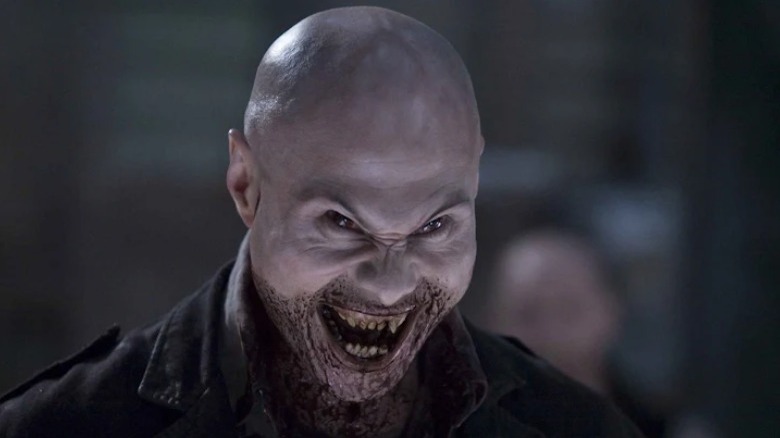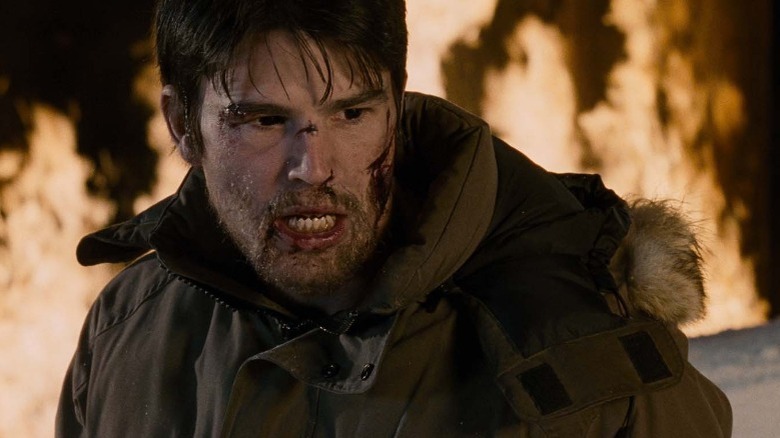Year Of The Vampire: 30 Days Of Night Tells An Ice-Cold Vampire Story
(Welcome to Year of the Vampire, a series examining the greatest, strangest, and sometimes overlooked vampire movies of all time in honor of "Nosferatu," which turns 100 this year.)
You don't realize how warm-blooded vampire movies tend to be until you find one that's truly cold. The creatures of the night often thrive in contrast: their bloodlessness seeks our warm lifeblood, their supernatural detachment is countered by their frequent ability to seduce and compel. So what happens when a horde of vampires are truly cold inside and out? "30 Days of Night" happens.
The chilliness of David Slade's bloody 2007 horror film is both literal and figurative. The film takes place at the northernmost city of the U.S., Barrow, Alaska. Its color palette is all frozen blues and shadowy blacks, bringing a snowstorm and an endless night to life with slick but disorienting visuals. It's also cold in other ways: The relentless action of the movie doesn't allow viewers much room to invest in its characters, but does let us see them hacked apart by axes and shorn by sharp teeth. At times, it feels like the vampire film's answer to "The Mist," a horror film designed for maximum hopelessness and not much else. Still, its commitment to the bit is admirable, and it is a very good bit.
What it brought to the genre
"30 Days of Night" isn't a perfect movie, but it has a damn near perfect premise. It's pretty simple: There's a part of the world that sees no sunlight for a full month in the winter. Since vampires naturally can't hunt during the day, a particularly savage and savvy group of them decides to take a winter holiday to Barrow, so they can feast and run free for a month straight. When the group arrives on the scene, guided by their oddly compelling, black-eyed ringlearder Marlow (Danny Huston), one of them expresses that it's a wonder they didn't think of this idea sooner. The same could be said for the vampire genre as a whole.
Josh Hartnett stars as Sheriff Eben Oleson, and Melissa George plays his estranged wife, Stella. Early in the film, Stella misses the last plane out of town before nightfall, which is the first of many nasty bits of bad luck for the family. Almost immediately after night falls, disturbing events start to happen. Someone kills all the dogs in a shelter. A man at a diner (Ben Foster, committed as always) requests raw hamburger meat and won't stop making cryptic, ominous statements. Soon, the vampires make themselves known, and what follows is an all-out bloodbath.
The vamp as the Alaskan outsider
Vampires have long-since been used as stand-ins for the "Other," a faction that's seen by hegemonic groups as social dangers or invaders. In Bram Stoker's "Dracula," for example, the creature's foreignness is frequently accentuated, while in Sheridan Le Fanu's "Carmilla" and modern vamp sagas like "True Blood," the monster is a clear stand-in for queer identities. In "30 Days of Night," these monsters are also clearly intruders: they speak in a sort of screeching shriek that are relayed via subtitles, and their traditions — like separating human heads from bodies — are never fully explained.
The vampires more obviously marked as outsiders, though, in contrast with the people they're hunting. Barrow is clearly a hardscrabble, working-class town, and the vampires don't just invade homes, but also factories, construction sites, and places of business. They gut the town, but more importantly for a place where every job is essential, they gut its livelihood, too. The movie doesn't explicitly encode these vamps as xenophobic stand-ins for tourists, migrant workers, or any one group (they don't want to live in the town, just leave it in ashes), but it follows in a long tradition of vampire stories that do.
"30 Days of Night" is far from a perfect movie: its direction is wobbly, and it's never entirely scary. Yet its unique setting creative approach to the vampire myth makes it an engrossing watch, and it puts a fresh, setting-specific spin on the centuries-old tradition of the vamp-as-outsider. It's also fast-paced, relentless, and ultimately even darker than the endless night in which it's set.


